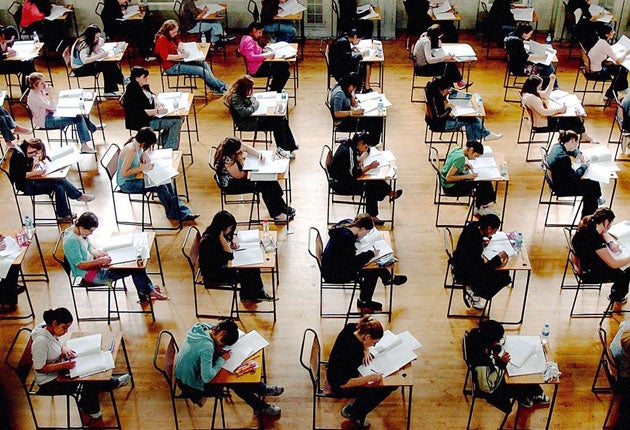More primary pupils hit educational targets

More children left primary school this summer with a good grasp of the basics, official figures show.
But one in three youngsters still failed to achieve the level expected of them in reading, writing and maths, according to figures published by the Department for Education (DfE).
The statistics show that 67% of 11-year-olds in England achieved at least a Level 4, the standard expected of the age group, in these three subjects in their national curriculum tests.
This is up from 64% last year, a 3% rise.
But it still means that 33% of youngsters missed out.
The results mean that nearly 183,000 pupils left school without a good grasp of reading, writing and maths this summer.
Overall, the results for each test showed:
:: 84% of youngsters reached Level 4 in reading, up from 83% last year;
:: 75% reached the expected level in writing, compared with 71% in 2010;
:: In total, 81% achieved Level 4 in English (made up of the reading and writing tests), up from 80% last year;
:: 80% achieved the expected level in maths, against 79% the year before.
But the figures also show that the numbers of pupils scoring Level 5, one above the expected standard, in English have slumped.
Just 42% of pupils achieved a Level 5 in reading this year, compared with 50% in 2010, while 20% reached this level in writing, against 21% last year.
It means that, overall, just 13% of pupils achieved a Level 5 in reading, writing and maths combined.
In 2010, this figure was 14%.
Schools Minister Nick Gibb welcomed the rise in Level 4 results, especially in writing.
But he said: "A third of children are still struggling in the three Rs. There has been a decline in the proportion of children - both boys and girls - who can read and write beyond the expected level. And the results of our weakest readers and writers also remain a real concern.
"We are determined to raise standards of reading. There will always be some children for whom reading is a struggle. However, we can and must do much better for the one in 10 boys who at the age of 11 can read no better than a seven-year-old."
Mr Gibb added that the Government is introducing a reading test for six-year-olds to identify those who are struggling.
"It is also critical that children read for pleasure. All primary school children should have a reading book on the go at home. Evidence from around the world indicates that the more a child reads, the better their attainment in all subjects - not just reading - will be."
Today's figures, which are for England only, also show the proportions of pupils leaving primary school having only attained the standard expected of a seven-year-old.
One in 10 boys (10%) - almost 28,000 youngsters - reached Level 2 or less, compared to 5% of girls (just over 13,000 pupils).
Overall, 7% of both boys and girls only reached the level expected of a seven-year-old in reading.
Five percent of pupils only reached Level 2 in writing, meaning that in total, 6% of youngsters reached this level in English.
Five percent of 11-year-olds reached Level 2 or lower in maths.
For the second year running teacher assessments of pupil performance were published alongside the national curriculum test results for 550,000 pupils.
According to teacher assessment, 81% of pupils reached Level 4 in English, 82% achieved this level in maths, and 85% achieved it in science.
The DfE also published results of science test results taken by a sample of 11-year-olds.
Based on this sample, it is estimated that 84% of 11-year-olds are reaching the expected level in science.
National curriculum tests, known as "Sats" are taken by pupils in their final year of primary school, and have been fiercely opposed by teaching unions, with a boycott held by two teaching unions last year.
This summer, a survey conducted by the National Association of Head Teachers (NAHT) found that nearly 2,000 heads reported problems with this year's tests, raising concerns that pupils had been let down by poor marking.
Ministers announced plans last month, following an independent review, to scrap the creative writing paper from 2013.
The writing paper, which forms part of the overall writing test, has long been seen as the most controversial, with teachers arguing it is hard to mark because answers are open to interpretation.
Pupils will sit a beefed-up test in spelling, grammar and punctuation in the future.
Join our commenting forum
Join thought-provoking conversations, follow other Independent readers and see their replies
Comments
Bookmark popover
Removed from bookmarks